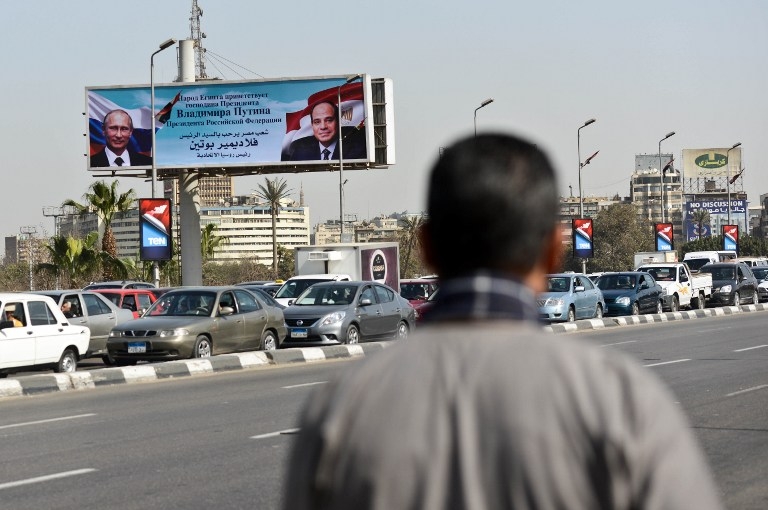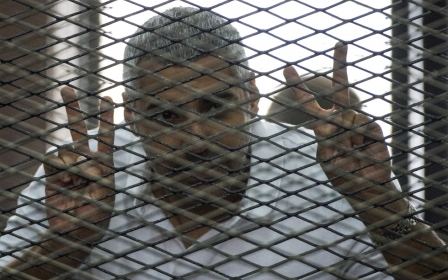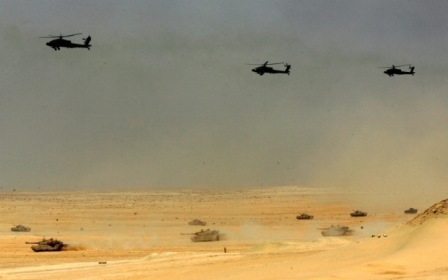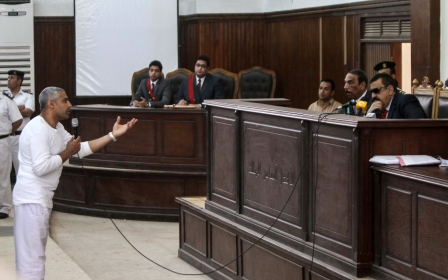Brotherhood the origin of all extremism, Sisi says

Egyptian President Abdel-Fattah al-Sisi is feeling vindicated by the world’s alarm over Islamic extremism that is fuelling wars and bloodshed across the Middle East.
The former army general has faced widespread criticism for his removal in 2013 of Egypt’s first freely elected president and his fierce crackdown on Islamists that has killed more than 1,000 and imprisoned at least 20,000. A year and a half later, after Sisi’s election as president, his critics fear he is leading his country into autocracy, with pro-democracy dissenters jailed or silenced.
But in an interview with German magazine Der Spiegel on Tuesday – one of a handful the president has given to foreign media outlets since he took office in June – Sisi insisted his actions were to combat militancy and save the country from civil war. He said Egypt is a “model for fighting terrorism” and that the US-led coalition to fight the Islamic State group in Iraq and Syria should take note.
“More than a year ago, I warned that the region was heading to great danger from extremist thought,” he said. “It didn’t receive proper attention until the events in Iraq took place and the Islamic State swept over the Iraqi-Syrian borders…"
In the interview Sisi provided his most detailed explanation yet of why he decided to oust Islamist president Mohamed Morsi, the nation’s first democratically elected president. He also said that Egypt was on the verge of completing its “democratic roadmap” and appealed for foreign investment.
Sisi described the army’s ouster of the Brotherhood in 2013 after mass protests as a “second revolution”. “What you refer to as a coup was our second revolution,” he said.
Pushed for an explanation about the death of 817 protesters during the dispersal of a Muslim Brotherhood protest camp, Rabaa al-Adawiya, by armed police in Cairo in the summer of 2013 a month after the army toppled Morsi, Sisi said he had acted to prevent Egypt from descending into civil strife such as that afflicting Syria, Iraq, Libya and Yemen.
“The number of victims at Rabaa could have been 10 times higher if the people had stormed the square. And the Egyptians were prepared to do that,” he said. “We had repeatedly called on the protesters to clear out peacefully. If you look at the number of people who died, you will realize the army protected the Egyptian people…”
When the reporter retorted that, in Germany, police would have used tear gas, “not bullets,” to disperse protests Sisi appeared to attribute the behaviour of his authorities to a “civilisational gap” between the Middle East and Europe. He said: “I am not ashamed to admit that there is a civilisational gap between us and you. The police and people in Germany are civilised…”
Despite recent calls by Egyptian politicians to reintegrate the Muslim Brotherhood – whose leadership is largely jailed and in exile – back into mainstream politics on the grounds that, forced underground, the group might resort to violence, Sisi seemed resolute that the Brotherhood were behind the instability in the country; a cause of the problem, not a part of a solution.
Asked whether he thought the militant Islamic State group or the Muslim Brotherhood posed a greater threat to the region Sisi said: “They both share the same ideology. But the Muslim Brotherhood is the origin of all of it. All these other extremists emanated from them.”
Sisi’s comments to the German magazine seemed to betray a lingering suspicion of Egypt’s largest opposition movement, which has a substantial urban and rural core constituency, and its abilities to influence public opinion abroad.
“In our fondness for Germany, we even understand that you have misconstrued the events here because you were influenced by the Muslim Brotherhood. The Brotherhood has managed to manipulate public opinion.”
Middle East Eye propose une couverture et une analyse indépendantes et incomparables du Moyen-Orient, de l’Afrique du Nord et d’autres régions du monde. Pour en savoir plus sur la reprise de ce contenu et les frais qui s’appliquent, veuillez remplir ce formulaire [en anglais]. Pour en savoir plus sur MEE, cliquez ici [en anglais].




